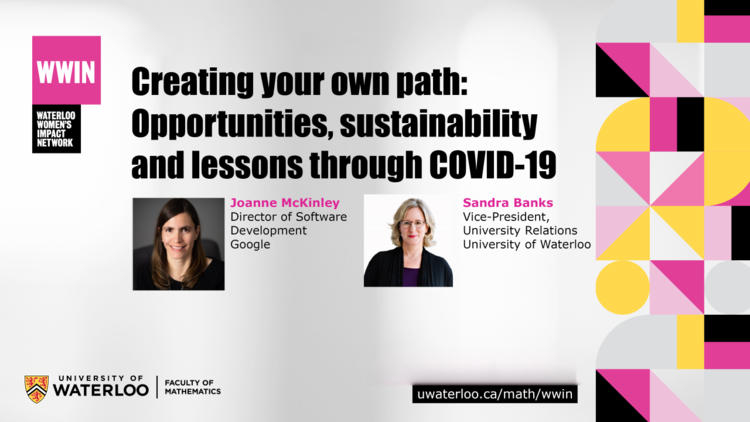Joanne McKinley (MMath ’02), the Director of Software Development at Google, shares advice for women seeking success on their own terms.
Joanne McKinley’s 2020 was a year of remarkable achievement.
In March, she received the 2020 J.W. Graham Medal in Computing and Innovation in recognition of her exceptional contributions and leadership in software development, as well as her work as an advocate and role model for women in technology. Later that year, she became Google Canada’s first Director of Software Development and the first woman director to be promoted at Google Waterloo.
What makes McKinley’s accomplishments even more impressive is that she has done all this while working just 32 hours a week. A strong advocate of work-life balance, she reduced her working hours after becoming a mother in order to spend more time with her young family.
In March, she joined Sandra Banks, Vice-President, University Relations, for our winter WWIN webinar. The discussion ranged from her recent milestones to overcoming resistance to taking on leadership roles to the challenges of COVID-19.

Here are a few takeaways:
Throw out your preconceptions about what success looks like
For many years, McKinley did not pursue a director position because she simply couldn’t picture herself in the role. When she thought of a director, she imagined someone working long hours, spending huge amounts of time travelling and neglecting their health to keep pace with the demands of the job—all things she was unwilling to do.
“That was the behaviour that was being role modeled for me, so I sort of assumed that was a requirement of the position,” says McKinley.
But when McKinley had the opportunity to work with an executive coach, she was encouraged to rethink these assumptions. “The coach, she sat me down and said, ‘Does any of that actually appear in the job ladder?’ and it didn’t” says McKinley. “She helped me realize that I’m not going to have the perfect role model out there, but I can be that role model for others.”
Today, she is a mentor to many Google employees, helping them realize their potential by challenging their beliefs and assumptions. She receives more mentee requests than she has time for, so she prioritizes women and other underrepresented minorities, as well as those seeking flexible work schedules. Even still, she is forced to turn down many employees, showing just how strong the demand for female mentors is within the tech industry.
Speak out and ask for change
Early in her career, McKinley was reticent to speak out and ask for the conditions she needed to thrive, but this changed after having her first child.
“I couldn't bear the idea of leaving my child but I also couldn't bear the idea of not doing my job,” says McKinley. She asked to work part-time and her proposal was accepted. “It was simply a matter of asking and then also proving that you can do it as well.”
She believes that, too often, we put up with less-than-ideal circumstances rather than speaking up and asking for a change. Over time, this leads to feelings of disempowerment and resentment.
And there’s another positive to asking for change: you might end up helping your coworkers.
“If you're the one that speaks up, politely and respectfully, there may be other people as well who just weren't saying anything. Now, you've made it better for everyone.”
Prioritize. Prioritize. Prioritize.
McKinley says people are often astounded to hear she can fit her work into 32 hours a week. She responds by noting “but you probably feel like you can't do your job in five days either.”
Her point is simple: the key to fulfilling your job responsibilities in less time is a skill we all already practice. Prioritization. Faced with an inexhaustible supply of work and a finite amount of time, we focus on accomplishing the most important tasks first.
“You just have to become more intentional about strict prioritization,” says McKinley. “I actually think it's about as easy as that.”
Practice gratitude
Balancing work and home life is never easy—especially during a pandemic—and McKinley is quick to point out she has yet to fully master the art. To cope in times of adversity, McKinley tries to recall those things she can be thankful for.
“I think gratitude is a tool I personally have found very useful in coping with the most difficult times,” says McKinley. “I ask myself ‘What is actually going well? What are some things that I can be grateful for?’ And then I start thinking, ‘what can I do to increase these things?”
It’s a matter of finding and then amplifying the positive, no matter how small, in a difficult situation.
“Asking, ‘What are the things that I am in charge of or I can have control over?’ as opposed to feeling like a victim of circumstances is a good way to help change one's mindset into something positive.”





